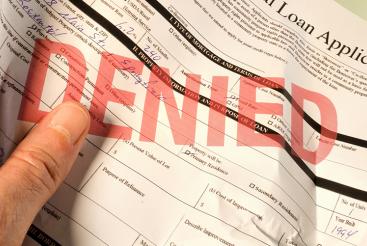What should you do if you're rejected for a credit application?

Have you ever been rejected for a loan or credit application? You're not alone. A bad credit report can affect how lenders see you, and can affect the likelihood you will be accepted for a loan in the future. If you've ever forgotten to pay a bill and had a default listed on your credit report, or you've been consistently late on your home loan payments, lenders may see that information based on a credit check.
All is not lost if you're rejected by a lender.
You might feel cheated out of credit because of a default from three or four years ago, but that's all up to the credit provider. All is not lost if you're rejected by a lender though. The first thing you should check before you even apply for credit is the current state of your credit report.
Why do lenders reject people based on their credit reports?
Your credit report is full of valuable information to a lender, including any defaults you've had in the past and your payment history for other loans (including home loans)1. If you've had a default, it could show to a credit provider that you're not a reliable debtor, and they may not want to take that risk.
The same goes if you've been late for other payments before. You have a due date for most bills, like your home loan payments, and if you miss these on a regular basis it shows that you're a poor financial planner, and it likely indicates to the provider that you're going to pay them late as well1. That's not something they want to deal with.
A credit provider can also reject your application for credit based on a range of other factors outside your credit report depending on their lending policies and criteria. This may include your current bank balance1. If it doesn't show that you're in a stable financial position, they may not want to deal with you (although your current money trouble might be the reason you're applying for credit in the first place).

What should you do if you're rejected for a credit application?
Being rejected for credit isn't the end of the world - the first thing you should do is ask for a copy of your credit report from Equifax. This will help you to understand what the problem might be and what you can do to resolve it.
It may not be in your best interest to make another credit application with a different credit provider straight away. If you do this, another credit enquiry can be listed on your credit report and the new credit provider can see you have recently applied for credit, if they conduct a credit check. This may lead them to think one of two things:
- That you were rejected for credit for a good reason; or
- That you were approved which now means you have more debt to pay anyway.
In order to be successful, however, you need to ensure that your credit report is in such a state that you aren't going to be rejected at all.
Therefore, it's in your best interest to conduct extensive research on the credit available to you and only apply for one or two of the best options. Nevertheless, in order to have your credit application approved, you need to ensure that your credit report has minimal adverse events and financial blemishes such as defaults or court judgments.
Additionally, you can prove you're a reliable debtor by paying all of your bills on time (for an extended period of time) and not picking up the odd default just because you forgot to pay an account. Your credit profile is important, so you should treat your bad credit report as a learning tool. Find out where you went wrong, and never do that again.
If you've been rejected for a loan, there are steps you can take to get back on track. For more information, get in touch with Equifax today.
Disclaimer: The information contained in this article is general in nature and does not take into account your personal objectives, financial situation or needs. Therefore, you should consider whether the information is appropriate to your circumstance before acting on it, and where appropriate, seek professional advice from a finance professional such as an adviser.
1MoneySmart, Loan rejection. Accessed May 2017.
Get your Equifax credit report for FREE today
Learn moreYou might also like

How to manage your bad credit history stress-free
Have you been stressing about your bad credit report? You'll be doing more harm than good. Start working out a way to pay off your debt and be stress-free.

Why have I been declined credit?
There are number of reasons why a lender may decide to decline your credit application. When you first apply for credit, credit providers such as lenders, phone or utilities companies may check your credit history alongside the information you have provided as part of your application process.

3 myths about your credit report
There are many mysteries surrounding what affects your credit score. Take a look at these three commonly believed myths that could catch you out.
